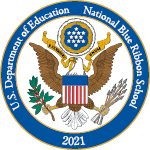Information
Connect
Campuses

Parents frequently ask us how we handle children when they misbehave, and we often answer that children at Challenger preschool don’t have time to misbehave. Even though that is true, it is only part of the answer. We also teach students skills to manage themselves so they can learn to recognize and apply the benefits of doing so.
It would be much easier when a child acts up to demand that the child stop misbehaving and punish him. But that doesn’t happen at Challenger School because we know that technique doesn’t work; nor does it teach skills for improvement. We’re serious when we state that we “prepare children to become self-reliant, productive individuals . . .” To do this requires a well-planned schedule, an interesting and challenging curriculum, and patient teachers who provide clear, consistent expectations and offer positive reinforcement as the students learn and successfully apply what they are being taught.
Yes, we teach reading, math, logic, art, science, and music. Teaching self-management skills, however, is an equally important and critical area of focus in a Challenger preschool. Every activity, routine, and lesson taught at Challenger is also designed to help students learn how to manage themselves in one of the following four ways:
Emotionally
Learning to control emotions such as anger, jealousy, frustration, and fear is an important skill for a preschooler to learn. Uncontrolled emotions in an adolescent or adult can be the downfall of an otherwise talented and intelligent person.
A child may have a negative emotional reaction when she is unsure of expectations or circumstances. That is precisely why we have routines—repeated sequences that help prepare students to function in familiarity.
For example, every day when a preschooler arrives at school, she is met with the familiar arrival routine. The student knows to place her belongings in her cubbie and go directly to the table for morning writing and cutting activities. Once the students realize that they will start every day with the same sequence of activities, fear and uneasiness dissipate with the excitement of knowing what to expect and where they need to go next. As a result, students begin to feel safe and become confident in their abilities to manage themselves in this known situation. They are then ready to learn additional routines to help them handle new situations.
Socially
Another important skill that we teach is learning to live and communicate with other people in an acceptable way. As children learn to communicate their ideas and desires with words—rather than with tantrums and hitting—they begin to develop important relationships with friends and family.
Consider this example. During recess one day, a student snatches a ball from one of his classmates and runs away laughing. The next day, he complains to his teacher that the other children won’t play with him. The teacher guides the child to identify how his behavior has contributed to the situation. The teacher then asks questions to help the child recognize what he could do differently in the future to avoid such a consequence.
Mentally
By helping students develop the ability to focus, we help them increase the capacity for learning. We recognize that three- and four-year-olds have short attention spans, so we use time wisely and efficiently to get the most learning out of every minute. We engage students with short, effective lessons and routines to help them learn to listen and focus. When we present a new concept—like identifying vowels—we may present the letters and their sounds in a short lesson before moving to a fun musical activity about springtime. After the students have enjoyed bouncing along with the “popcorn popping” song, we return to the lesson. As the students refocus their attention on vowels, we may use an exciting card activity to assess if the students can identify vowels in certain words. Throughout the days, weeks, and months, the lessons gradually and steadily increase in length and difficulty as students become better at focusing.
Physically
It is important for students to learn to respect and take ownership of their personal belongings. From day one of Challenger preschool, a student learns where his assigned cubbie is located. He learns that this is the spot where his Challenger bag, his school papers, and his sweater are kept each school day. Do we do this because we want an orderly classroom? Yes, but more importantly, the students come to understand that 1) each student is responsible for the safety of his own bag and other belongings—his teacher is not going to follow behind and pick up after him; and 2) if the student chooses to follow instructions, his belongings will be safe and orderly, but if he drops his bag or does not place his school papers and sweater in his cubbie, his property could get damaged. This is a simple and understood sequence for adults. But for three- and four-year-olds, this is a concept that needs to be taught—and reviewed and retaught repeatedly—until the children learn to recognize that they are indeed capable of taking care of their belongings. As students learn to care for their own belongings and are taught the reasons why caring for their things is an important benefit to them, students come to better respect other people’s things as well.
We teach skills that help students learn to manage themselves emotionally, socially, mentally, and physically because when coupled with the academics and life-enhancing values taught at Challenger, our students are equipped for success in school and in life.